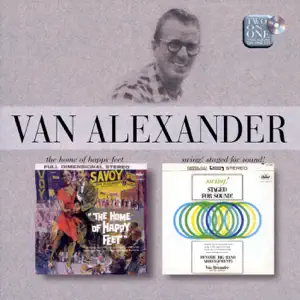


CIUDAD NATAL
New York, NY
NACIMIENTO
2 de mayo de 1915
Acerca de Van Alexander
His mother may have been a concert pianist, but the famous big band arranger and composer Van Alexander scored his biggest success with a much simpler influence, nursery rhymes. His arrangement of "A-Tisket, A-Tasket," done in collaboration with the sublime vocalist Ella Fitzgerald, was the biggest hit for both of them. Although originally created in 1938 as a vehicle while she was vocalist with the Chick Webb band, it became one of her most endearing signature songs, as well as providing this composer with both steady royalty checks and a road map for future excursions. "Where, Oh Where Has My Little Dog Gone?" and "Got a Pebble in My Shoe" explored a similar territory, wherein a sophisticated jazz vocalist retreats into childhood worries.
Alexander wasn't limited to such topics, by any means. He also had an ocean fixation, evidenced with compositions such as the fishy "Bouillya Baise" and the prophetic "There's a Ship Comin' In," which could also double as a description of this artist's career as he made the rounds of recording sessions and special productions with artists such as Kay Starr, Dakota Staton, Paul Whiteman, Benny Goodman, Dinah Shore, Doris Day, and Peggy Lee. He was also busy in the film music scene, with a particular talent for film noir. He wrote scores for Baby Face Nelson, The Big Operator, and The Private Lives of Adam and Eve, among others. In contrast, Alexander also created the original music for many television shows in which the atmosphere was a far cry from the sleazy film noir milieu, including Hazel, The Farmer's Daughter, Bewitched, I Dream of Jeannie, and Dennis the Menace. Some of his most inventive television music, not surprisingly, was created in response to the shenanigans of anarchistic comedian Jonathan Winters during the memorable run of his own series, The Wacky World of Jonathan Winters. Yet another side of his arranging and conducting talents was represented in television variety shows starring Mickey Rooney, Gordon McRae, Jimmy Stewart, and the most relaxed boss of all, Dean Martin, with whom Alexander stayed for more than seven seasons as arranger and assistant conductor.
Alexander's first professional job was with Webb, prior to which he was a composition student enamored with the sounds of black bands. In high school, when he was still using his real name of Al Feldman, Alexander had already established his interest in bandleading and arranging, experimenting with six- and seven-piece orchestras. Beginning with selling two arrangements to Webb for ten dollars each, by the end of 1938 Alexander had already raised his price much higher thanks to the popularity of "A-Tisket, A-Tasket." Eventually, he formed his own band, working mainly on the theater circuit into the early '40s. His groups were training grounds for many young players, such as the fine drummer Shelly Manne, who was 16-years-old when he joined up with Alexander. As this environment for performing began to fizzle, Alexander was invited to Hollywood by Bob Crosby and went into the studios there, creating projects under his own name as well as hiring out as an arranger and conductor.
His career was one of the best examples of a big band performer switching gears following the end of the Second World War, when most of the large touring musical organizations were collapsing. He was considered something of a genius in the art of "underscoring," or providing the incidental music that goes on in the background of a scene. It is a complicated art form, as on the surface the composer is creating something that nobody really pays attention to. Yet without the music, the scene would fall completely flat. His influence on Hollywood film music is all encompassing, including a textbook he wrote on the craft of arranging in 1950 entitled First Arrangement. Subsequent generations of film composers such as Jay Chattaway and Dennis McCarthy would most likely carry a copy of this book into court to swear on, if the opportunity ever presented itself. The Oscar and Grammy-winning composer and arranger Johnny Mandel studied arranging with Alexander in the early '40s. The teacher and his protégé probably had get-togethers where they compared their awards. As for Alexander, his trophy chest includes a Grammy for the nursery rhyme hit, given to him, Fitzgerald, and Webb 50 years after the fact; a series of Emmy awards for his television music; and the award for Lifetime Achievement from performing rights mega-organization ASCAP.
Alexander wasn't limited to such topics, by any means. He also had an ocean fixation, evidenced with compositions such as the fishy "Bouillya Baise" and the prophetic "There's a Ship Comin' In," which could also double as a description of this artist's career as he made the rounds of recording sessions and special productions with artists such as Kay Starr, Dakota Staton, Paul Whiteman, Benny Goodman, Dinah Shore, Doris Day, and Peggy Lee. He was also busy in the film music scene, with a particular talent for film noir. He wrote scores for Baby Face Nelson, The Big Operator, and The Private Lives of Adam and Eve, among others. In contrast, Alexander also created the original music for many television shows in which the atmosphere was a far cry from the sleazy film noir milieu, including Hazel, The Farmer's Daughter, Bewitched, I Dream of Jeannie, and Dennis the Menace. Some of his most inventive television music, not surprisingly, was created in response to the shenanigans of anarchistic comedian Jonathan Winters during the memorable run of his own series, The Wacky World of Jonathan Winters. Yet another side of his arranging and conducting talents was represented in television variety shows starring Mickey Rooney, Gordon McRae, Jimmy Stewart, and the most relaxed boss of all, Dean Martin, with whom Alexander stayed for more than seven seasons as arranger and assistant conductor.
Alexander's first professional job was with Webb, prior to which he was a composition student enamored with the sounds of black bands. In high school, when he was still using his real name of Al Feldman, Alexander had already established his interest in bandleading and arranging, experimenting with six- and seven-piece orchestras. Beginning with selling two arrangements to Webb for ten dollars each, by the end of 1938 Alexander had already raised his price much higher thanks to the popularity of "A-Tisket, A-Tasket." Eventually, he formed his own band, working mainly on the theater circuit into the early '40s. His groups were training grounds for many young players, such as the fine drummer Shelly Manne, who was 16-years-old when he joined up with Alexander. As this environment for performing began to fizzle, Alexander was invited to Hollywood by Bob Crosby and went into the studios there, creating projects under his own name as well as hiring out as an arranger and conductor.
His career was one of the best examples of a big band performer switching gears following the end of the Second World War, when most of the large touring musical organizations were collapsing. He was considered something of a genius in the art of "underscoring," or providing the incidental music that goes on in the background of a scene. It is a complicated art form, as on the surface the composer is creating something that nobody really pays attention to. Yet without the music, the scene would fall completely flat. His influence on Hollywood film music is all encompassing, including a textbook he wrote on the craft of arranging in 1950 entitled First Arrangement. Subsequent generations of film composers such as Jay Chattaway and Dennis McCarthy would most likely carry a copy of this book into court to swear on, if the opportunity ever presented itself. The Oscar and Grammy-winning composer and arranger Johnny Mandel studied arranging with Alexander in the early '40s. The teacher and his protégé probably had get-togethers where they compared their awards. As for Alexander, his trophy chest includes a Grammy for the nursery rhyme hit, given to him, Fitzgerald, and Webb 50 years after the fact; a series of Emmy awards for his television music; and the award for Lifetime Achievement from performing rights mega-organization ASCAP.
Canciones más vistas de
Van Alexander en Abril
Top Artistas
Nosotros
Notas
